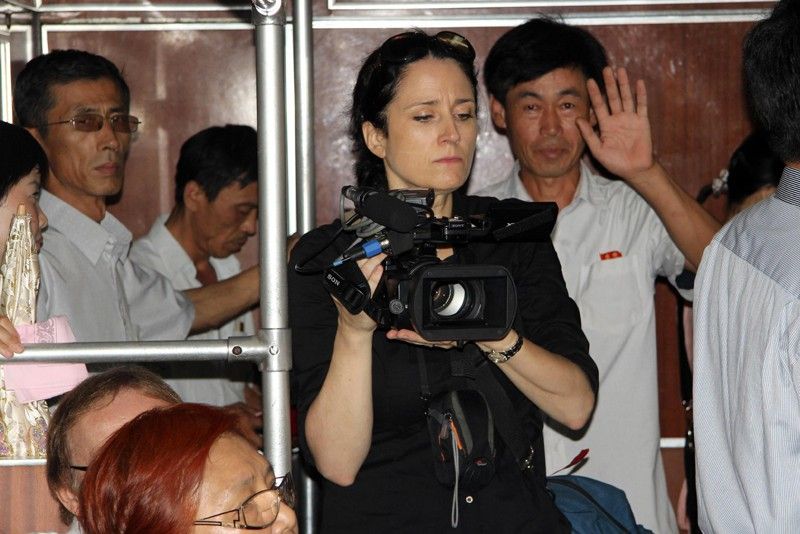Paula Hancocks: Journalism has never been more important

We turn the tables on CNN international correspondent Paula Hancocks, as she becomes the subject of the story – and how her mother became the inspiration to her illustrious career.
Uncomfortable — that’s what veteran journalist Paula Hancocks says with a laugh, when I ask her how she feels being the subject of an interview. She’s used to talking about other people, but talking about herself, she says, is a totally different ballgame.
But the CNN international correspondent has a lot of stories to tell, many of which put her right in the middle of the action: for over 20 years, she’s been at the frontline of warzones and civil conflicts all over the world. She’s no stranger to the risks of reportage. For the past few years, she has been reporting from CNN’s news bureau in Seoul, giving the world a better understanding on issues in North Korea, and even covering Typhoon Haiyan in Tacloban.
With such a wealth of experience on the field, and amidst the growth of fake news these days, Hancocks is proof that a trusted name can spell the difference between fact and fiction. So during her recent visit to Manila, we spoke to her about the truth behind conflict areas, the responsibility of journalists today, and the woman that inspired a career on the field — her own mom.
Supreme: You’ve reported from all over the world, and now you’re in South Korea — reporting about the Asian region. What can you say about the wealth of stories from this side of the world?
Paula Hancocks: I came from the Middle East, Jerusalem, and also London before that. The one difference, since I’ve been in Asia — I’ve not covered a war zone since. In the Middle East, there’s the Israeli-Palestinian conflict, there’s a lot of tension. There were a lot of conflicts going on at the point. Since coming to Asia, it’s so varied, the sort of stories that you cover there. Obviously, my main bread and butter is North Korea, because I’m based in North Korea. But it’s not just that, there are so many issues in South Korea; I’ve been here in the Philippines. I was in Tacloban for the Typhoon Haiyan. There are just so many difference slices of life stories you can do in Asia. It’s a fascinating place.
You’ve covered warzones, and you’ve been in the middle of conflict areas. What’s something you wish people understood more about conflict, so that they’d perhaps see what the true weight of it really is?
I think all the conflicts I’ve covered — and a lot of them are in Iraq, Afghanistan, Gaza, these sort of places — it’s generally the children who suffer the most. It’s very difficult to see how children are affected by the war. As an adult, yes, you are traumatized by it. Yes, you do not agree with the fact that a war is going on. But you’re old enough to understand why it might be happening. A child does not understand why they’ve lost their parents, they’ve lost their homes, they’ve lost their children. It’s devastating to see what war does to children. And these are young children who will grow up with that trauma, with that horror. And the true horror of war is seen through a child’s eyes. If more people did that, I think there would be less wars.
So many people are exposed to different sources of news now, and fake news is so prevalent. And people distrust journalists more than ever. Would you say that the responsibility of journalists has changed now, compared to when you started?
Yeah, our job’s never been more important. And trusted names in news, trusted news outlets, trusted newspapers have never been more vital in bringing the true story to people. We have seen an increase in viewership. Things like the New York Times, the Washington Post, have seen an increase in subscriptions. When there’s so much noise out there, there are so many accusations of fake news, if someone doesn’t like the news you’re portraying or the truth you’re telling… It’s brought a lot of people back to traditional media, back to names they know and trust, and they know fact-check. Because the most important thing is facts. The phrase “alternative facts” is horrifying. A fact is a fact. There’s no two ways about that. So I think our job that our sources are valid, making sure that we check and double check… it doesn’t matter that you’re first and wrong, it matters that you’re right. Take that little extra time to check something.
What inspires that strength, to push back at those who challenge the work that you and other reporters do every day?
I mean, this might be a cliché to say, but my mom shaped the way I work. She used to be a journalist as well, so it was actually her newsroom stories that made me think, “Oh, I wanna do that. That sounds amazing.”
Did she encourage you to get into journalism?
She just told me stories of when she was a journalist. She told me she loved it, but she never pushed me to be a journalist. She made it sound really amazing. And I’m glad she did. I love this job, and I can’t think of any other job that I’d want to do. She definitely had a strong impact on me.















